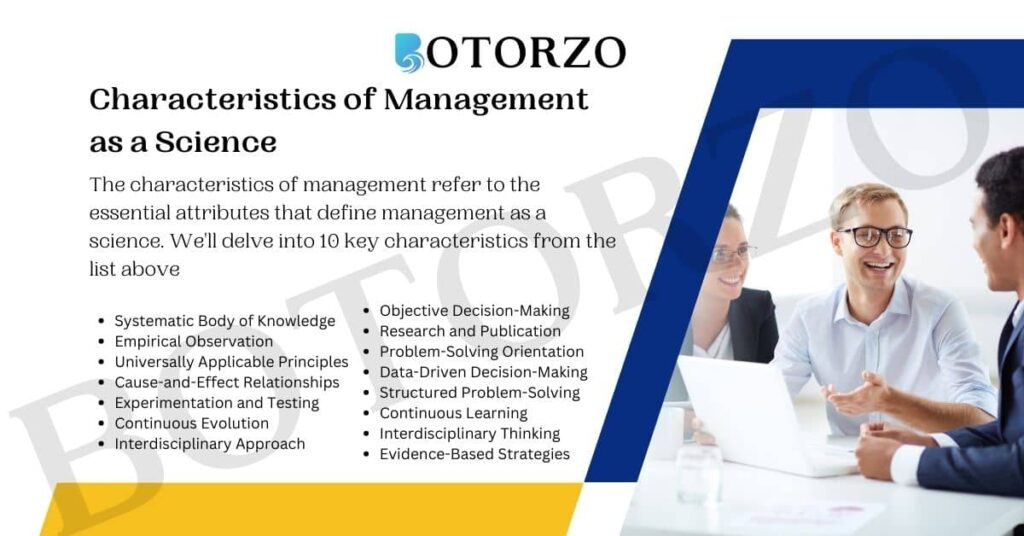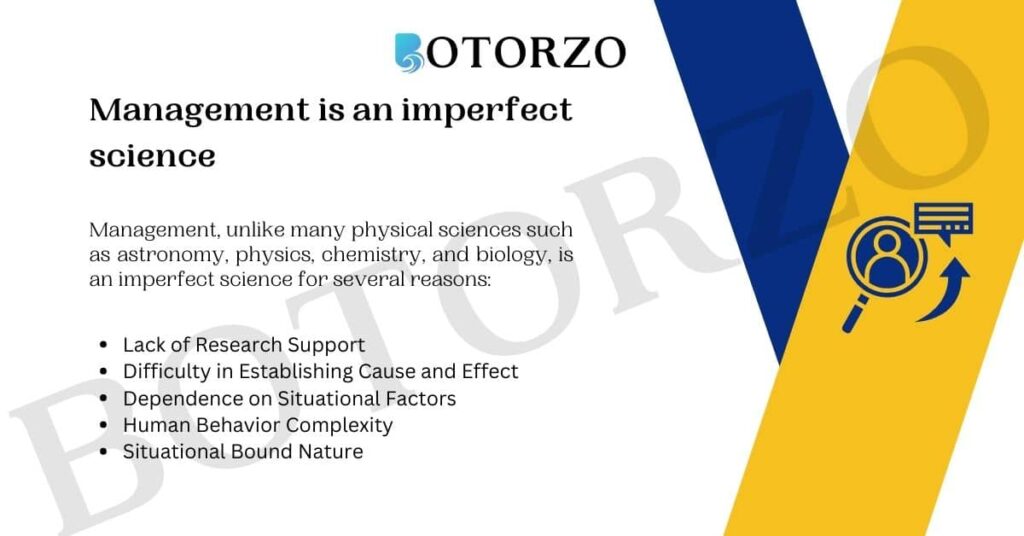
Management is often considered both an art and a science. In this context, let’s explore why management as a science is considered Science, as a systematic and evidence-based approach to understanding and solving real-world problems, play a crucial role in the field of management. Management science provides a structured framework for addressing the complex and dynamic challenges that organizations face. It relies on empirical observation, research, and the development of universally applicable principles to make informed decisions and achieve desired outcomes.
Read: Meaning, Definition, Concept, And Characteristics Of Management
Why Management is Considered as a Science

Management is considered a science due to its systematic and evidence-based approach to understanding and solving complex organizational challenges. It relies on empirical observation, research, and the development of universally applicable principles. Managers collect real-world data and use it to make informed decisions, reducing the influence of personal biases.
While specific practices may vary, there are fundamental principles in management that are considered universally applicable, providing a common foundation for effective management. Management also seeks to establish cause-and-effect relationships, conducts experiments to test theories, and evolves over time based on new insights. This scientific approach enhances problem-solving, decision-making, and overall organizational performance.
Characteristics of Management as a Science

The characteristics of management refer to the essential attributes that define management as a science. We’ll delve into 10 key characteristics from the list above:
- Systematic Body of Knowledge
- Empirical Observation
- Universally Applicable Principles
- Cause-and-Effect Relationships
- Experimentation and Testing
- Continuous Evolution
- Interdisciplinary Approach
- Objective Decision-Making
- Research and Publication
- Problem-Solving Orientation
- Data-Driven Decision-Making
- Structured Problem-Solving
- Continuous Learning
- Interdisciplinary Thinking
- Evidence-Based Strategies
Systematic Body of Knowledge
Systematic Body of Knowledge: Management has developed a structured body of knowledge, comprising principles, theories, and models. This organized framework offers a systematic approach for effective organizational analysis and management. It provides a foundation for decision-making and problem-solving by providing structured guidelines that can be applied in various situations.
Empirical Observation
Empirical Observation: Management relies on real-world data and observations. Managers collect and analyze data to make informed decisions and solve problems. This empirical approach ensures that actions are based on concrete evidence rather than subjective personal biases or intuition, increasing the reliability of managerial decisions.
Universally Applicable Principles
Universally Applicable Principles: While specific management practices may vary across different industries and contexts, there are fundamental principles in management that are considered universally applicable. These principles create a common foundation for effective management, promoting consistency and reliability in management practices.
Cause-and-effect
Cause-and-effect Relationships: Management seeks to establish cause-and-effect relationships between various management variables. It explores how changes in leadership styles, organizational structures, or processes can impact performance and productivity within an organization. This analysis helps in making more informed and effective management decisions.
Experimentation and Testing
Experimentation and Testing: Management theories and practices are subject to experimentation and testing. Managers implement changes or strategies and measure their impact, allowing them to assess what works best based on empirical evidence and data. This scientific approach enables organizations to adapt and refine their management strategies.
Continuous Evolution
Continuous Evolution: Management is not a static field; it continually evolves over time. New theories, models, and best practices emerge, and the field adapts to incorporate these insights. This evolution is essential for improving organizational efficiency and effectiveness in a dynamic business environment.
Interdisciplinary Approach
Interdisciplinary Approach: Management integrates knowledge from various disciplines, including psychology, economics, sociology, and engineering. This multidisciplinary approach provides a holistic understanding of organizational dynamics and challenges, enabling managers to address complex issues from multiple perspectives.
Objective Decision-Making
Objective Decision-Making: Scientific management emphasizes objective and rational decision-making. Decisions are grounded in data and evidence rather than being influenced by personal biases or opinions. This approach enhances the quality and reliability of managerial decisions, contributing to improved organizational outcomes.
Research and Publication
Research and Publication: Management research is conducted, and findings are published in academic journals and books. This knowledge dissemination facilitates peer review, validation, and the accumulation of evidence-based best practices. It promotes transparency and rigor in the development of management principles and techniques.
Problem-Solving Orientation
Problem-Solving Orientation: Management is primarily concerned with solving practical problems that organizations encounter. It aims to provide evidence-based solutions that enhance organizational performance, reduce inefficiencies, and drive success. This problem-solving orientation is at the core of effective management, helping organizations adapt to changing conditions and achieve their goals.
Data-Driven Decision-Making
Data-Driven Decision-Making: Managers emphasize using data and evidence to make informed decisions, reducing the impact of personal biases on the decision-making process.
Structured Problem-Solving
Structured Problem-Solving: Management knowledge offers a structured approach to problem-solving, aiding in the analysis and solution of organizational challenges in a systematic and methodical manner.
Continuous Learning
Continuous Learning: Managers understand that management is a dynamic field that evolves over time. Staying updated with evolving practices and adapting approaches accordingly is essential for continued success.
Interdisciplinary Thinking
Interdisciplinary Thinking: Managers adopt a multidisciplinary perspective, drawing on knowledge from various fields, such as psychology, economics, sociology, and engineering. This comprehensive understanding enables them to address complex organizational issues from multiple angles.
Evidence-Based Strategies
Evidence-Based Strategies: Managers apply principles and practices that have been validated by research. By doing so, they optimize organizational effectiveness, reduce uncertainty, and make informed decisions that contribute to the success of the organization.
Read: Engineering
Management is an imperfect science

Management, unlike many physical sciences such as astronomy, physics, chemistry, and biology, is an imperfect science for several reasons:
- Lack of Research Support
- Difficulty in Establishing Cause and Effect
- Dependence on Situational Factors
- Human Behavior Complexity
- Situational Bound Nature
Lack of Research Support: Many management principles lack strong empirical support from research. Unlike in the physical sciences, where theories are often rigorously tested and proven, management principles may not be as well supported.
Difficulty in Establishing Cause and Effect: Unlike fields like Chemistry or Biology, where cause-and-effect relationships can often be precisely established, management is more complex. The interconnected nature of organizational dynamics makes it challenging to pinpoint direct cause-and-effect relationships.
Dependence on Situational Factors: The application of management principles depends heavily on situational factors. What works well in one context may not be as effective in another due to the unique nature of each organization and its environment.
Human Behavior Complexity: Management deals with people at work, and accurately predicting human behavior is challenging. Human behavior is influenced by a multitude of factors, making it difficult to make precise predictions. Management is often referred to as a ‘Social Science’ due to its focus on the complexities of human interactions.
Situational Bound Nature: Management is a universal phenomenon, but its principles and theories can yield different outcomes in different situations. The context in which management is applied plays a significant role, and as a result, the applicability of management principles may not consistently lead to the same results.
Ernest Dale’s characterization of management as a ‘Soft Science’ underscores the idea that management is not as exact or universally predictable as many physical sciences. It is influenced by the inherent complexities of human behavior and organizational dynamics, making it a more fluid and adaptable field.
Frequently Asked Question
Why is management considered a science?
Management is seen as a science due to its systematic, evidence-based approach to solving organizational challenges.
What are the key characteristics of management as a science?
Management’s characteristics include empirical observation, universally applicable principles, cause-and-effect relationships, and more.
Why is management sometimes called an imperfect science?
Management is imperfect because it lacks strong research support, involves complex human behavior, and depends on situational factors.
How does management differ from physical sciences?
Management differs by dealing with human behavior, making precise cause-and-effect relationships more challenging.
What’s the meaning of ‘Soft Science’ in management?
Soft Science’ in management implies that it’s not as exact or universally predictable as some physical sciences, adapting to various situations.
How does management rely on empirical observation?
Managers collect real-world data to make informed decisions, reducing personal biases
What’s the significance of universally applicable principles in management?
These principles create a common foundation for effective management across diverse contexts.
Why does management emphasize experimentation and testing?
Experimentation helps managers assess what works best based on evidence and data.
Why is evidence-based decision-making crucial in management?
It ensures that decisions are grounded in data and evidence rather than personal biases, enhancing the quality of decisions
